Go back
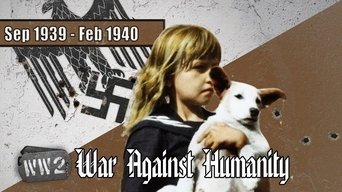
Outbreak of the War Against Humanity - 5 March 1940
Episode number: 1
Overview: When the Second World War breaks out, it is at first largely a war between one side of totalitarian aggressors against a portion of the democratic countries of the world defending other totalitarian states. From the first day of the war in Poland, as it already is in China, this will be a war against humanity.

System of a Nazi Terror - April 1940
Episode number: 2
Overview: In April 1940 in Poland, if you are on the list of Nazi or Soviet non-desirables, there are three options: run for your life, be shipped off to a camp, or face the execution squad... if you happen to be Jewish it's likely to be the fourth option: the Ghetto.

The Strategy of Terror Bombing - May 1940
Episode number: 3
Overview: When WW2 breaks out, the belligerents promise to not bomb civilians. The promise is broken, literally within minutes by the Nazis and within weeks by the Soviets. Now, nine months later the Allies are about to follow suite.

The European Migration Crisis - June 1940
Episode number: 4
Overview: When the Nazi German Reich invades western and northern Europe this creates a massive refugee and forced migration crisis all across Europe. In eastern Europe, The Nazis and the Soviets have already been forcing families out of their homes to be relocated, incarcerated and murdered for nine months by now.

The British Blitz Spirit is a Myth
Episode number: 5
Overview: Strategic bombing was used to destroy the popular support for their governments war effort, and the British boosted that their resistance to bombing was an unique trait. But both are false, based on lies and propaganda.

The Few Who Opposed Hitler - German Resistance in 1940
Episode number: 6
Overview: Were all German faithful Nazis? Not by a stretch, but a resounding majority approved of the Nazis, especially before the war, and again after the victory in France. Anyone that actively opposed Hitler and his gang were not only risking their life, but faced an uphill battle against public opinion. And yet... some people did.

Vive la Résistance! well, not really... - French Resistance 1940
Episode number: 7
Overview: Immediately after France is occupied by the Nazis in 1940, the French are divided about what to do; resist or collaborate? To put it mildly, it's complicated.

Royal Resistance in Benelux and Scandinavia 1940
Episode number: 8
Overview: When the Racism of Naziism hits the Nationalism of Monarchism, it doesn't quite go like Hitler would have imagined.

Resistance in China - Myth or Reality?
Episode number: 9
Overview: The war in China already started in 1931 when Japan invaded Manchuria. Early resistance was small and was met by heavy Japanese retaliations. But throughout the 30's, the movement started to grow.

Poland Will Not Bow to Nazis & Stalinists
Episode number: 10
Overview: Poland faces two brutal occupiers led by Hitler and Stalin, hellbent on wiping Poland off the map. But the Poles have been preparing to stand up and resist since before the war - and now they do.

Sending the Jews to Madagascar? - July 1940 - April 1941
Episode number: 11
Overview: The War Against Humanity is accelerating and accelerating. Across the world, people live under oppression. In Nazi Europe, solutions to the so-called "Jewish Question" has taken on new, fantastical, proportions.

The Wehrmacht's License to Kill the Innocent - May 1941
Episode number: 12
Overview: As the Britain Blitz slows down considerably, violence in Croatia increases dramatically as the Ustaše government purges the country of Jews and Serbs and the Wehrmacht gets deadly instructions for their Invasion of the Soviet Union.

The Holocaust Begins in Lithuania - June 1941
Episode number: 13
Overview: The German Fallschirmjäger target the Cretan civilian population as they take the Island with big losses. But the War Against Humanity intensifies dramatically as Operation Barbarossa is launched on 22nd June, 1941.

Barbarossa, Hitler's and Stalin's Hell on Earth - July 1941, Pt. 1
Episode number: 14
Overview: When the German armed forces invade the USSR, they come with an order to exterminate from Hitler. Now the defending Soviet armed forces receive similar orders from Stalin. The bloodshed that follows defies human imagination.

Generalplan Ost, the Nazi plan to kill the Slavs - July 1941, Pt. 2
Episode number: 15
Overview: In China, and the Soviet Union, all sides are causing widespread death to the local civilians. The defending forces are scorching the earth and plundering their own civilians, the attacking armed forces of Japan and Germany are executing planned genocide and mass destruction.
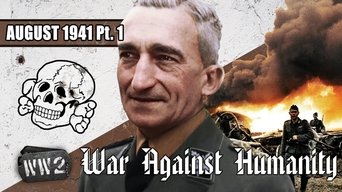
Extermination Now! - August 1941, Pt. 1
Episode number: 16
Overview: Not all plans for Operation Barbarossa are as successful as hoped. In August 1941, Adolf Hitler and Heinrich Himmler push forward their plans to wage war on all Jews, unleashing the Einzatsgruppen and the SS Cavalry Brigade of Hermann Fegelein on the Jewish people of Eastern Europe.

The SS and Wehrmacht Murder Inc. - August 1941, Pt. 2
Episode number: 17
Overview: Fegelein's and Himmler's actions to 'comb' the Pripet Marshes for Jews continues. The largest mass-murder yet is committed in Kamianets-Podilskyi, while new methods to commit genocide on an industrial scale are being devised.

Resistance is Futile in Nazi Europe - September 1941, Pt. 1
Episode number: 18
Overview: In the first half of September, Nazi murder campaigns in Vilnius and the Pripet Marshes continue. In the rest of Europe, the Germans tighten their grip on the occupied countries, taking away media privileges and further restricting the freedoms of Jewish populations.
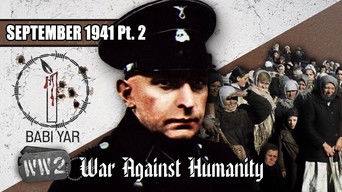
The Rape of Humanity at Babi Yar - September 1941, Pt. 2
Episode number: 19
Overview: Killing Jews by the thousands becomes the main way of eradicating the Jews in Eastern Europe in August and September 1941. The Mass Murder at Babi Yar in Kiev is yet another escalation in that process.

The Wehrmacht is Not Clean! - October 1941, Pt. 1
Episode number: 20
Overview: The Wehrmacht is deeply involved with the Nazis' War Against Humanity. They are complicit in the murder of thousands of Jews in the 'Holocaust of Bullets', and the severe treatment of Soviet Prisoners of War. In October 1941, Wehrmacht General Walther von Reichenau issues the 'Severity Order', taking away any ambiguity there may be as to the Wehrmacht's vision.
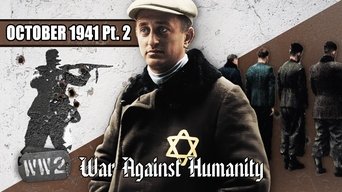
The Banality of Death - October 1941, Pt. 2
Episode number: 21
Overview: French resistance members liquidate a high-ranking German officer, triggering a series of retaliatory actions by the German occupiers. Meanwhile, actions in the 'Holocaust of Bullets' continue in the east as German forces move further into the USSR, taking Odessa.

How To Kill 15,000 People in One Day - November 1941, Pt. 1
Episode number: 22
Overview: As German troops pull into eastern Ukraine, locals fight back in any way they can. Some of them have been the target of Soviet brutalisation for decades. For many who are deemed 'enemy of the Third Reich', the first two weeks of November 1941 are their last, as the 'Holocaust of Bullets' continues.
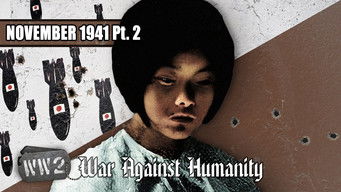
Japanese Plague Bombs - November 1941, Pt. 2
Episode number: 23
Overview: Japanse deploys Biological Weapons in China, leading to un unspecified number of deaths. Meanwhile, European Jews from Germany and their occupied territories are deported to Eastern Europe, where Jews are already being killed by the thousands.
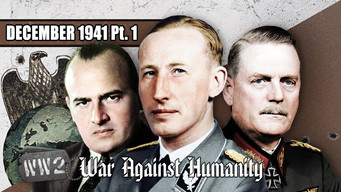
Pearl Harbor and the Global War Against Humanity - December 1941, Pt. 1
Episode number: 24
Overview: December 1941 marks the shift to a new chapter in the War Against Humanity. New fronts open up, exposing millions more to the horrors of war. Other developments continue their path of continuous escalation.

Christmas with Adolf Hitler - December 1941, Pt. 2
Episode number: 25
Overview: Christmas 1941. A holiday season in a year of darkness and suffering, where Hitler celebrates his own greatness as the world goes up in flames.

Germany Bankrupts Greece - Countless Die in Famine - January 1942, Pt. 1
Episode number: 26
Overview: The early weeks of 1942 show how much of a global War Against Humanity this really is. People in occupied zones across the globe suffer under the boot of their tormentors. In Greece, thousands die in a famine, while repressive tactics claim the lives of many more in the Balkans. The Holocaust continues in cities and the extermination camp of Chełmno, while the Japanese army wreaks havoc in South-East Asia as they advance on Allied positions.

Did 90 Minutes Decide the Fate of the Jews? - The Wannsee Conference - January 1942, Pt. 2
Episode number: 27
Overview: To most, the Wannsee Conference is synonymous with the moment the Holocaust started. In fact, the meeting is mainly designed to formalise policy, and to involve political and governmental organisations in the crime.

Britain Chooses War Crimes - RAF Strategic Bombing - February 1942, Pt. 1
Episode number: 28
Overview: As the winter of 1942 continues, many Soviet civilians suffer under the German Siege of Leningrad. Meanwhile, the British are shifting their bombing strategy from targeting factories to targeting homes.

U.S. Detention, Nazi Deportation, and Death in the East - February 1942, Pt. 2
Episode number: 29
Overview: Franklin D. Roosevelt signs an order to intern all Japanese-American citizens on the West Coast of the United States, while the Italians open up new concentration camps to deal with their ethnic enemies in the Balkans. At the same time, a large group of Jews attempts to escape Europe by boat, with disastrous consequences.
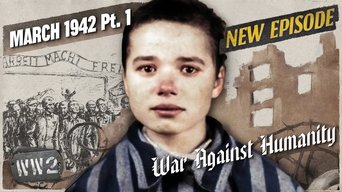
Extermination Begins at Auschwitz - March 1942, Pt. 1
Episode number: 30
Overview: The crackdown on 'undesired' ethnic populations in the Balkans continues as Mario Roatta issues 'Circular 3C'. The Germans kill 5000 German Jews in the 'Dünamünde Action', and the Japanese purge the Chinese communities of Singapore in the 'Sook Ching' massacre. Additionally, the new camp of Auschwitz Birkenau opens its doors in Poland.

Fifty Families Murdered Every Hour - March 1942, Pt. 2
Episode number: 31
Overview: A report on the effect of strategic bombing called the 'Dehousing Paper' is spread to justify the targeting of the civilian population of Germany. In Poland, one by one, extermination camps are starting construction. This month, a new one is finished, named Belzec. Here, Jews and other minority undesirables from Poland are gassed.

The Bataan Death March Begins - April 1942, Pt. 1
Episode number: 32
Overview: Malta and British cities are victim to German bombs, while the Japanese advance in Burma causes a refugee crisis. In the Philippines, 80,000 Allied POWs walk the Bataan Death March.

The Horrors of Partisan Warfare - April 1942, Pt. 2
Episode number: 33
Overview: April 1942 sees bombing campaigns in Germany and Britain, as well as German anti-partisan actions in the Balkans and Eastern Europe.

100,000 Dead British Subjects in Burma - May 1942, Pt. 1
Episode number: 34
Overview: A large number of European and asian inhabitants of South-East Asia are locked up in Japanese prison camps, while in Burma, a big refugee crisis claims the lives of thousands. In Auschwitz-Birkenau and Sobibor, gassing Jews on an immense scale begins.

The Plot to Kill Hitler's Hangman - Operation Anthropoid - May 1942, Pt. 2
Episode number: 35
Overview: Arthur Harris and his RAF Bombers carry out a massive bombing raid on Cologne. Meanwhile, one of the architects of the Holocaust, Reinhard Heydrich is the target of a spectacular assassination attempt.

Heydrich, Architect of the Holocaust, Dies - June 1942, Pt. 1
Episode number: 36
Overview: Reinhard Heydrich is fighting for his life, as the hunt of his assassins continues. Meanwhile, news of the nazi atrocities starts to reach the Allied countries.

Japan's Institutionalization of Rape - June 1942, Pt. 2
Episode number: 37
Overview: During the occupation of South-East Asia, Japan builds a large system of institutionalised rape to 'keep their soldiers happy'. Meanwhile, Allied refugees from Burma find a safe haven in India, but for some, hardship continues.
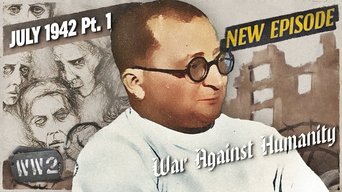
Forced Sterilization Experiments Begin at Auschwitz - July 1942, Pt. 1
Episode number: 38
Overview: Operation Millennium is discontinued, while in Poland the Auschwitz Birkenau camp starts to systematically gas thousands of people a week. Some who aren't murdered on arrival are subjected to horrific medical and sterilization experiments.
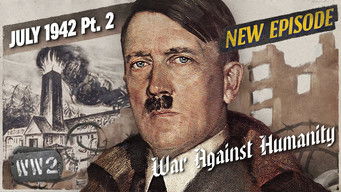
The 100 Deadliest Days of the Holocaust Begin... - July 1942, Pt. 2
Episode number: 39
Overview: The extermination camps of Operation Reinhard are ready to start killing hundreds of thousands of inhabitants of the Warsaw Ghetto, starting the deadliest 100 days of the Holocaust.

The Symphony That Defeated the Wehrmacht - August 1942, Pt .1
Episode number: 40
Overview: The Big Action at the Warsaw Ghetto continues, while The Japanese carry out retaliations against the Chinese for aiding American airmen. Dmitri Shostakovich's 'Symphony no. 7' premieres in the besieged city of Leningrad.

Why Don't the French Resist? - August 1942, Pt. 2
Episode number: 41
Overview: Citizens in Stalingrad face German bombs as Soviet officials refuse to evacuate. The German counter-insurgency effort increases, but people continue to resist against all odds. The Treblinka camp breaks down under the ambitions of its commandant, Irmfried Eberl.
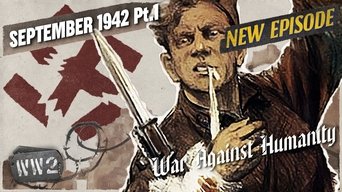
Kill The Nazis - September 1942, Pt. 1
Episode number: 42
Overview: The Nazi German occupiers have kept increasing their pressure in occupied territory, and fooled their victims to still have hope, but at some point when the oppression gets unbearable, or all hope is lost, people will resist.

How Britain Oppressed India - September 1942, Pt. 2
Episode number: 43
Overview: People in India are increasingly fed up with their British rulers and calls for independence grow. Resistance against the Nazis is also growing in Eastern Europe, which causes ruthless retaliations against the civilian population.

Resist. Collaborate. Die. - October 1942, Pt. 1
Episode number: 44
Overview: Resistance against occupation starts rising in the Autumn of 1942. It faces opposition not only from the occupiers, but also from collaborators killing their own countrymen.

A United Front Against Nazi Atrocities - October 1942, Pt. 2
Episode number: 45
Overview: As the war intensifies on all fronts, the occupied world is aflame with resistance and reprisals. From Paris to Papua New Guinea, Humanity is under attack - but it is also fighting back.

Fighting Nazis with Radios and Funerals - November 1942, Pt. 1
Episode number: 46
Overview: As the Winter of 1942/43 is beginning, the German Nazis are under more and more pressure, both on the frontlines and in the occupation zones.

The Germans Learn to Love Their Slaves - November 1942, Pt. 2
Episode number: 47
Overview: In November 1942 the resistance fight in many parts of Europe becomes a part pf the regular military war. In Germany the Germans discover humanity while the German mass murders see no end.

Death Squads Arrive in North Africa - December 1942, Pt. 1
Episode number: 48
Overview: Despite Allied occupation, the situation of the Jews in North Africa hardly improves, in newly German-occupied Tunisia it deteriorates. Meanwhile, the world learns more of the details of the Holocaust - they cannot believe their ears.

Let the Hunger Games Begin - December 1942, Pt. 2
Episode number: 49
Overview: The world learns more details of the War Against Humanity in Occupied Poland, while in China and India starvation looms.

The Revenge Bombing of Germany - January 1943, Pt. 1
Episode number: 50
Overview: While Nazi Germany keep on escalating its War Against Humanity, the United Nations Alliance decides that they will escalate their war on Germany.
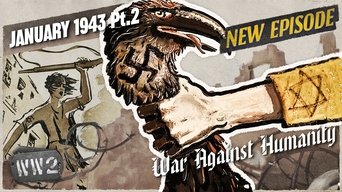
The Warsaw Ghetto: The Jews Strike Back - January 1943, Pt. 2
Episode number: 51
Overview: In early 1943 Nazi German propaganda minister Joseph Goebbels is preparing to rally the German people behind an unrestrained war - or “total war” as he puts it. It’s unclear what that means, Nazi Germany is long waging an unrestrained war, and it seems that the United Nations Alliance is now ready to do the same on Germany.
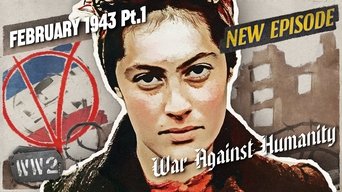
Eat the Nazis, There’s Nothing Else - February 1943, Pt. 1
Episode number: 52
Overview: As the United Nations Alliance, and the Resistance in occupied Europe increase their pressure on Nazi Germany, they continue to escalate their war on humanity. Meanwhile, in more and more parts of the world there is little to eat.

Total War NOW - February 1943, Pt. 2
Episode number: 53
Overview: Germany declares total (unconditional war) putting its economy on a full war footing over three years into the war. Given the unconditional war they are already waging, and the resistance and opposition they now face, it’s unclear what it shall mean.

Assassinate Hitler, or Die Trying - March 1943, Pt. 1
Episode number: 54
Overview: In the weeks after Goebbels' Sportpalast speech, we realize that Total War might mean an apocalyptic end for Germany, with Hitler's blessing. No wonder that some Germans are looking to end Hitler before he ends them, and what a blessing that at least one Nazi with influence on the fate of thousands of Jews turns out to have a heart and soul.

Denazify the World. Resist Now. - March 1943, Pt. 2
Episode number: 55
Overview: The Nazis and the Soviets discover each other's atrocities, while resistance is on the rise, and a half dormant conspiracy against Hitler comes back to life to take his life.

The West Sacrifices Poland to the Soviets - April 1943, Pt. 1
Episode number: 56
Overview: There are cracks in the alliances on both sides. Hitler’s allies are refusing to do his every bidding, and the revelations about the Soviet massacre of Poles in Katyn has set a wedge between Poland and the USSR.

The Jews Fight Back - April 24, 1943
Episode number: 57
Overview: The war against Naziism is escalating on all fronts - in the War Against Humanity the main battleground is now the Warsaw Ghetto.

Dead Refugees Are Better Than New Immigrants - May 1, 1943
Episode number: 58
Overview: As the SS continues to crack down on the uprising in the Warsaw Ghetto, Great Britain and the US decide not to help Jewish refugees.
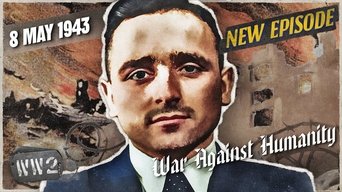
Barbie and the Trail of Blood - May 8, 1943
Episode number: 59
Overview: Europe is burning and it seems there is little that will end the suffering except victory over Naziism.

Heaviest Air Raid in Human History - May 15, 1943
Episode number: 60
Overview: As the Warsaw Ghetto Uprising is being quashed, there are renewed Japanese atrocities in China, and the RAF sets a world record by bombing German civilians.

Drowning Germans, Burning Jews - May 22, 1943
Episode number: 61
Overview: When Air Marshal Arthur Harris and Reichspropagandaminister Joseph Goebbels agree that a lot of death and destruction is not enough death and destruction, the world is in trouble.

The Deadliest Job in World War Two - May 29, 1943
Episode number: 62
Overview: Arthur Harris and the RAF set another record in bombing Germany, and the outnumbered Yugoslav Partisans show the Axis that numbers mean little when you’re clever.

Dr. Mengele Takes Command - June 5, 1943
Episode number: 63
Overview: Despair in Germany, more death in the Jewish ghettos, and Dr. Mengele tales command in Auschwitz-Birkenau.

Nazis in a Balkan Mess - June 12, 1943
Episode number: 64
Overview: In the Balkans, the Axis powers fail to rout Yugoslav and Greek Partisans. In Bengal, British India starvation is spreading, and in the Netherlands, the Nazis send 1,296 children and infants from the Vught Camp to the gas chambers at Sobibor.

Japan - Liberators of India? - June 19, 1943
Episode number: 65
Overview: As the people of Bengal and Iran continue to be tormented by hunger, so are the people of Germany and Yugoslavia by bombs. In Eastern Europe, the Germans continue to kill anyone they deem an enemy.

Decapitating the French Resistance - June 26, 1943
Episode number: 66
Overview: The Gestapo deals a devastating blow to French Resistance, and in Bengal, British India the famine is only getting worse.

The Master Race of Asia? - July 3, 1943
Episode number: 67

Killing the Resistance, and Rockets of Death - July 10, 1943
Episode number: 68
Overview: The Polish and French resistance find themselves weakened by the lots of their leaders. Hitler decided to give Werner von Brown hundreds of thousands of slaves to launch the German rocket program.
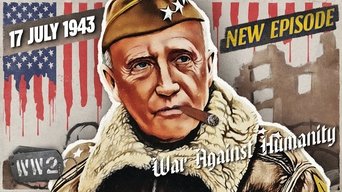
General Patton Orders War Crimes - July 17, 1943
Episode number: 69
Overview: This week, we see a contrast in the way different civilians behave within occupied Ukraine, Patton order war crimes, and Jewish resistance give up one of their own fighters.

Stalin, Hitler, and Churchill - Architects of Death - July 24, 1943
Episode number: 70

Hamburg’s Citizens Burnt Alive - July 31, 1943
Episode number: 71
Overview: In Italy the Fascists fall from power in a peaceful coup, while in Germany the RAF and USAAF bring down a rain of fire of biblical proportions in Operation Gomorrah, launching the Firestorm of Hamburg.

The Great Escape from Treblinka Death Camp - August 7, 1943
Episode number: 72
Overview: While enslavement, and mass murder continues unabated in August 1943, at the Treblinka Death Factory the forced laborers decide that enough is enough, and bring battle to the SS in a daring escape attempt.
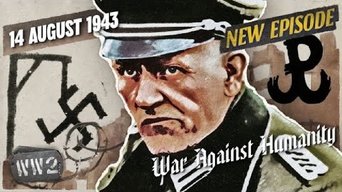
Amazing Money Heist by Polish Resistance - August 14, 1943
Episode number: 73
Overview: The reality of war finally seeps through to the majority of Germans, and it didn’t match up with the propaganda. Meanwhile resistance is increasing, and part of that is a classic money carriers when the Polish Home Army robs a money transport.
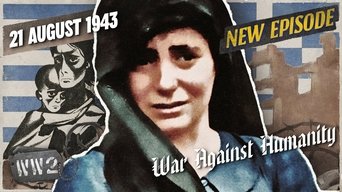
Greece Burns Under Nazi Occupation - August 21, 1943
Episode number: 74
Overview: The aerial bombing of Germany takes a new turn but continues to fail to bring long-term results. In occupied Greece and Poland, over a thousand children are murdered by the Nazis.

The Astonishing Nazi Underground Slave Factories - August 28, 1943
Episode number: 75
Overview: While the RAF and USAAF continue to try to bomb Germany into submission, the German Nazis move their war production underground. In the process they create an underground slave camp that defies imagination.

Amon Göth: The Super Nazi - September 4, 1943
Episode number: 76
Overview: While the Allies give up on the first Battle of Berlin, Amon Göth goes on a murderous rampage in the Tarnow Ghetto.

Italy Switches Sides in World War Two - September 11, 1943
Episode number: 77
Overview: When Italy leaves WW2, The Nazi German Reich immediately begins occupying the country, and the occupied nations it has held until now.

Albania - Hitler's Latest Ally? - September 18, 1943
Episode number: 78
Overview: The German Nazi Genocide of the Jews surpasses four million deaths, while the Soviet Union and US step up oppression against some their own citizens.

Nazis Go Fascist Hunting - September 25, 1943
Episode number: 79
Overview: The Wehrmacht continues Operation Axis and its slaughter of Italian soldiers. In Western Europe, the situation of the Jews becomes increasingly precarious, especially so in Denmark.

Sweden: The Jews' Salvation? - October 2, 1943
Episode number: 80
Overview: As the Allies advance in southern Italy, the people of Naples join them in fighting the Wehrmacht. In Denmark, the biggest rescue operation of Jews thus far begins.

The Nazis' Justification for the Genocide - October 9, 1943
Episode number: 81
Overview: This week the Nazis go on the record about their genocide of the Jews. Meanwhile the Jews in Denmark are coming closer to safety, and the Roman Jews are again at peril.

The Great Escape from Death Camp Sobibor - October 16, 1943
Episode number: 82
Overview: The German Nazis and their helpers are facing increasing resistance, this week in Rome from the Vatican, and at the Sobibor extermination camp from their victims.

Another bombed city - war still not ended - October 23, 1943
Episode number: 83
Overview: Trainload after trainload arrives at the slave and murder factories in Auschwitz, and a Fürstin is created in Kassel, while the United Nations War Crimes Committee UNWCC is formed.

Executed for Telling a Joke - October 30, 1943
Episode number: 84
Overview: From a conference in Moscow the United Nations Alliance issues a warning to Nazi Germany about their atrocities, while those atrocities continue unabated.
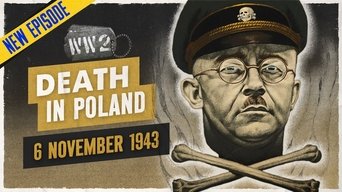
The Final Bloody Chapter of Operation Reinhard - November 6, 1943
Episode number: 85
Overview: The genocide of the Jews of Eastern Europe concludes with Operation Harvest Festival - Aktion Erntefest when 42,000 are murdered in the Lublin district.

The Auschwitz Business Model - November 10, 1943
Episode number: 86
Overview: Hitler commemorates the twentieth anniversary of the failed Beer Hall Putsch, in Auschwitz 50 men are shot in celebration, and Arthur Liebehenschel replaces Rudolf Höss as commandant.

Baltic Peoples Join the SS - November 17, 1943
Episode number: 87
Overview: Hitler forces Himmler to betray his promise of independence for the Baltic states, despite giving the Waffen-SS 40,000 of their young men. Ion Antonescu of Romania decides to save the remaining Romanian Jews to save his own ass.

The Secret Radio in Auschwitz - November 24, 1943
Episode number: 88
Overview: In Auschwitz the inmates gathering evidence of Nazi crimes score two successes, while the RAF score a direct hit on Goebbels as they set Berlin aflame. In the Pacific the accidental sinking of the SS Suez Maru triggers a Japanese war crime.

Bombing Berlin with Ed Murrow of CBS - December 1, 1943
Episode number: 89
Overview: Ed Murrow accompanies the RAF on a bombing raid on Berlin, and files one of his most iconic broadcasts with CBS. In Teheran, Winston Churchill walks out on a dinner with Joseph Stalin, after the USSR Premiere suggests mass murdering German officers.

V-1: Hitler's Deluded Revenge Plan - December 8, 1943
Episode number: 90
Overview: Japanese planes bomb Calcutta when it is still being crushed by the weight of the Bengali famine. Adolf Hitler and Albert Speer are obsessively trying to increase war production so Germany can begin launching its vengeance weapon against Britain. The wars of resistance continue across the Balkans with continued brutality and a new resistance force emerges in Italy.

The RAF's Worst Day of the War - December 15, 1943
Episode number: 91
Overview: The United Nations Allies has some success bombing the Nazi German Reich, but it comes at a heavy price. In the village Kalavryta in Greece, the Wehrmacht massacre hundreds of men and boys.

US Couples Miraculously Escape Japanese Massacre - December 25, 1943
Episode number: 92
Overview: Two escapes, one from the Nazis in Kovno (Kaunas) Lithuania, from the prison at Fort IX, and one from Japanese terror on Panay in the Philippines this week, will help to document the crimes of the Axis powers.